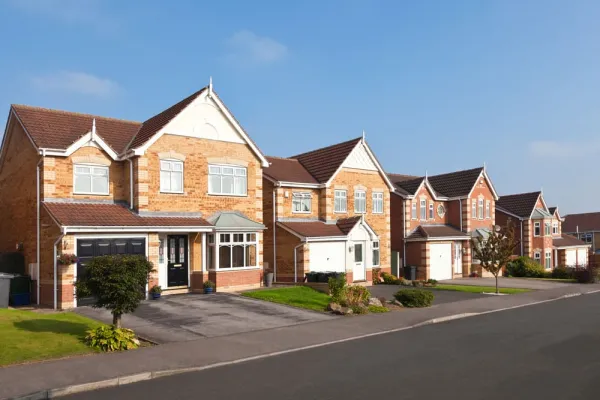A house is the most expensive thing that most people ever own.
It holds tremendous equity and is crucial to providing a roof over your head and ensuring your financial future.
You must protect your property however you can.
Buildings insurance is a perfect way to do this.
If you want to know what buildings insurance is and whether it’s right for you, you’re in the ideal place.
What is buildings insurance?
Buildings Insurance is a policy taken out by homeowners.
It allows you to protect the structure of your home, as well as permanent fixtures, from unexpected events.
Parts of property that buildings insurance protects
Some of the parts of your home that are usually protected include your:
- Roof
- Walls
- Floor
- Pipes
- Cupboards
- Garage
- Sheds
- Fences.
And dozens more.
Risks that buildings insurance protects against
A few examples of risks that buildings insurance protects against include:
- Fire
- Flooding
- Storms
- Vehicle or aircraft collisions
- Subsidence
- Vandalism
- Water damage from leaking pipes.
Buildings insurance suppliers
You can get buildings insurance from an insurance company. There are dozens of organisations across the UK that offer this product.
You must give details about your house and location when you apply for buildings insurance.
The circumstances will impact how much it costs.
For example, if you live in a high flood-risk area, you will have to pay a lot for your policy – if they agree to give you one.
Why do homeowners take out buildings insurance?
Buildings insurance is critical if you own a house.
This is because it gives you protection and covers your fees if major parts of the property are damaged.
You’ll find that almost all landlords have it, for example. This is because it covers something going wrong while they are renting a house out.
How much buildings insurance should I take out?
When you take out buildings insurance, you should insure yourself for the amount it would cost to rebuild your home completely.
It’s worth keeping in mind that material costs increase over time. You might thus want to review the number every couple of years.
Your buildings insurance costs could increase if you carry out extensions on your property.
After all, for the insurance provider, there is now ‘more house’ (so to speak!) being protected. This often requires a review of your existing policy.
Is buildings insurance the same as home insurance?
Not technically. Buildings insurance is a type of home insurance that covers the structure of your property.
The other type is contents insurance.
Meanwhile, home insurance is the overarching name for insurance on your home.
Is buildings insurance a legal requirement?
Buildings insurance is not technically a legal requirement. But almost all property experts strongly advise this.
If you’re taking out a mortgage, your lender often insists you get buildings insurance. If you don’t, they can refuse to lend you money.
If you’re a tenant
You don’t usually need to take out building insurance if you’re a tenant.
Your landlord should do this themselves, although it’s worth checking to make sure.
In this position, renters usually only need to insure their belongings.
If you’re a cash buyer
You can buy a house without insurance when you own it in outright cash.
If you’ve inherited a property
People who have inherited a house usually don’t need to take out buildings insurance in order to receive the home.
Note: Insurers can make up costs in other ways
Finding lenders that don’t force you to take out insurance is possible.
However, you should remember that they’ll usually make up for this by increasing the interest you pay.
What impacts the cost of building insurance?
Your property’s size is a significant factor in your building insurance costs. So too is the construction method and how likely a disaster is to occur.
For example, do you live in an area with a history of flooding, or bad storms?
Vandalism or subsidence being expected in the area is another contributing factor. Speak to an insurance expert for more guidance.
How much does building insurance cost?
The average UK price of building insurance is around £120 per year.
This figure will also be noticeably higher if you take out contents insurance.
Keep in mind that there can be significant variation over this figure. Your insurance provider considers many factors (size, local area, construction method, etc).
How often does a building insurance claim pay out?
The Financial Conduct Authority (FCA) says that 23% of home insurance claims are rejected. It depends largely on the situation.
When you take out building insurance, you’ll receive clear guidelines on what it covers. You should pay careful attention to these.
If your situation falls outside the lines, you could meet resistance from the provider.
Evidence matters
You’ll need to provide evidence of what’s happened to damage your house. Proof of a fire or a flood will be required, including what caused it.
If you can get a report from an independent professional – such as a surveyor, or even a police officer – then this can supplement your claim.
Insurance payouts take time
Remember that insurance providers are not known to move quickly when you make a claim.
There are dozens of scenarios when it can take over one year for them to pay out.
In other times, you often spend a few months waiting. The quicker you make your claim after the incident, the faster it will probably be handled.
Does a building insurance claim affect me in any way?
Insurance premiums
Making a building insurance claim usually increases the premium you pay in the future if you take out another policy.
This is because of the perceived increased risk for the provider.
Property value
A building insurance claim does not necessarily decrease the value of your property. But the circumstances surrounding it might.
For example, if your house has a history of flooding, vandalism or fire risk, people will pay less for it.
This applies even if you’ve sorted out the situation in the present day.
These topics often arise during a survey of your house, so you should be prepared for this.
Implications for letting
The same idea applies to renting out a property that you made a claim on.
If everything has been fixed, then the condition of the house might not be affected.
However, potential tenants could be reluctant to live in a house with a long history of issues.
This especially applies if they have to take out building and/or contents insurance themselves.
Should I take out building insurance?
Most experts strongly recommend that you take out building insurance, no matter what.
Your house is an extremely valuable asset and it’s thus crucial that you protect it.
Building insurance is also helpful if you need a mortgage, which most home buyers do.
Some of the largest banks, with the best interest rates, will not offer a mortgage on a property without building insurance.
It’s also usually in your interest to take out this insurance, if you live in a vulnerable location.
For instance, if you live in an area with lots of storms, floods, or fires, then insurance will ensure that your costs are covered in the event of a disaster.
















